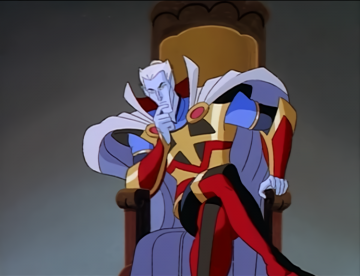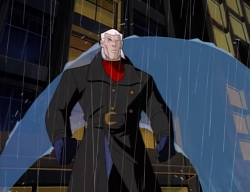Oberon
Oberon is the ruler of the Third Race.
Contents
History
Oberon is the son of Queen Mab by an unknown father. [1][2] During the 5th century A.D., Oberon became temporarily attracted to, and seduced, a Welsh noblewoman, by whom he became the father of Merlin. [3] At an unspecified point in the past, after Merlin's birth, Oberon overthrew Queen Mab in a great war, imprisoned her somewhere, and became ruler of the Third Race, who were thereafter known as Oberon's Children. They are not his literal children, of course; rather, they are children in a metaphorical sense, as his subjects, with himself as the "pater familias". [4][5][6] He married Titania, after he deposed Mab, and later on passed a magical decree that barred the Third Race from interfering in the affairs of mortals. [7]
Oberon intentionally did not take the title of King. Retaining his "Lord" title is his semi-skewed attempt at being more... egalitarian. [8] The Third Race (with some exceptions) generally believe him to be a relatively good leader, especially in comparison to Mab. [9]
Oberon and Merlin have strained relations, for as yet unknown reasons. [10] At some point, Merlin performed a service for Oberon which placed Oberon in his debt; as a result of this, Oberon permitted the wounded King Arthur Pendragon sanctuary on Avalon where he might be healed. [11]
Over the centuries, Oberon became increasingly disturbed and angered by the scorn and arrogance with which his Children treated mortals. At last, in 995, a particularly scornful (and as yet unknown) act of Titania's concerning mortals exhausted his patience, and became the catalyst for which he banished the entire Third Race from Avalon, to live in the mortal world for a thousand years. He also divorced Titania at this time. He lived for those thousand years in the outside world as well, but his adventures are as yet unchronicled.
In 1996, the Weird Sisters informed Oberon of the existence of the Avalon Clan, and he promptly returned to Avalon in considerable anger to expel them. When the Avalon Clan refused to leave, he ordered the earth to swallow them up, but Titania intervened at this point. She persuaded Oberon to fight out the issue in "single combat" (more or less), himself pitted against Goliath, Angela, and Gabriel, and temporarily weakened to the level of an ordinary faerie; as an incentive, she agreed to rewed him if he won. Oberon (who had presumably come to regret the divorce, and probably saw Titania's offer as a means of remarrying her without having to lose face) agreed to these terms, and in the ensuing battle, finally defeated the three gargoyles. But the Avalon clan, aided by a subtle clue of Titania's, made an iron bell out of the chains that the Magus had used to bind the Weird Sisters, and used it to subdue Oberon afterwards. Princess Katharine and Tom afterwards gave him their terms: if he agreed to let the Avalon clan remain on the island, they promised to no longer use the bell against him and his people. Oberon, astonished and impressed by their merciful behavior towards him (in that they had the opportunity to destroy him with the bell altogether, but chose not to use it), not only granted their request, but made the Avalon gargoyles his guard of honor, and declared that they would be from now on directly immune to his magic. Though the humans in the clan lack immunity as Oberon didn't realize they are consider to be members.[12] Afterwards, he rewed Titania, and held the Gathering, calling back all of the Third Race to Avalon. ("Ill Met By Moonlight")
All of them returned, except for the Banshee and Puck. The Weird Sisters brought back the Banshee by force, and Oberon placed a metal gag over her mouth to punish her for her disobedience. He then set out for the mortal world to bring back Puck personally, and came to New York, where he discovered Titania's secret identity as Anastasia Renard. Titania asked him to help her take away her new-born grandson Alexander to Avalon, where he could be trained in his magical heritage, and to this, Oberon agreed.
Xanatos, Fox, the gargoyles, Halcyon Renard, and even Puck (revealing himself as Owen's true identity in the process), all fought to stop Oberon from kidnapping Alex, but were overwhelmed. Just as Oberon was about to snatch Alex out of his cradle, a desperate Fox unleashed her formerly untapped magical ability, blasting Oberon with a spell that sent him hurtling through the nursery wall. Goliath used the opportunity to convince Oberon that Alex could be trained in magic in the human world, suggesting Puck as the means for this tutoring. Oberon agreed to it, but stripped Puck of all his powers except when he was protecting or teaching Alex, and banished him from Avalon forever. Afterwards, he left for Avalon. ("The Gathering" Part One, "The Gathering" Part Two)
Characteristics
Oberon is the most powerful of the Third Race, except for his mother Queen Mab, and even then, he was still able to overthrow her. [13][14] He possesses considerable authority over Avalon, and can order its trees and rocks to attack intruders; he had this ability even when temporarily weakened by Titania during his battle with Goliath, Angela, and Gabriel. He also possesses many other great powers, too numerous to mention. Like all of the Third Race, however, he is vulnerable to iron; when struck in the chest by Petros Xanatos' iron-tipped harpoon, he was temporarily withered into a gaunt, elderly figure (his ability to recover from such an attack should be an indication of just how powerful Oberon is; Greg Weisman has written that a less-powerful member of the Third Race would have probably died from a similar injury). [15]
Oberon is an arrogant figure, who does whatever he pleases and will not tolerate interference with his plans. But he is not a complete tyrant. He forbade his subjects to meddle in the lives of mortals out of comparative maturity, and although he himself does not always live up to such standards himself, he still takes them fairly seriously. He can be generous to his adversaries (as when he not only permitted the Avalon clan to remain on his island in the end, but even made it his guard of honor), and does abide by the letter of his law, if not always the spirit of it. His attitude towards mortals is one of fully aware superiority; he responds to their behavior often with a sense of fascinated (and detached) curiosity, although if they defy them, he quickly loses his temper.
While Oberon, like all of the Third Race, can alter his appearance at will, his "regular form" is that of a tall, haughty, aristocratic figure in royal garb, with white hair, blue skin, and "elvish" features.
Alongside being Merlin's father by a human woman, Oberon is also the father of a son and daughter by Titania. We know nothing more about them than that at present, however, other than the events surrounding the two are considered "not so happy". [16] He also fathered at least one other child upon a human woman: the little Indian boy over whom he and Titania quarreled in A Midsummer Night's Dream, though we do not know at present how accurate Shakespeare's portrayal of this quarrel was in the Gargoyles Universe. [17][18] It is also believed that Oberon has siblings, although it is currently unknown how many. [19][20][21]
Appearances
- "The Mirror" (Mentioned Only)
- "Avalon Part One" (Mentioned Only)
- "Avalon Part Two" (Mentioned Only)
- "Avalon Part Three" (Mentioned Only)
- "The Hound of Ulster" (Mentioned Only)
- "Ill Met By Moonlight" (First Appearance)
- "Future Tense" (Mentioned Only)
- "The Gathering" Part One
- "The Gathering" Part Two
- "Miracle Child" (Mentioned Only)
- "Acquisitions" (No Lines)
Real World Background
Oberon has been the king of the faerie-folk in traditional legend and literature since at least the early Renaissance. He is thought to have originated as Alberich, the dwarf-king of German legend (a figure particularly familiar to those who have seen Wagner's Ring Cycle). In the 13th century, he made his literary debut in the medieval romance Huon of Bordeaux, where he befriends Huon, one of Charlemagne's paladins. He is here described as the son of Julius Caesar and Morgan le Fay, and the height of a three-year-old child, due to a curse placed upon him as an infant. He assists Huon on his adventures, and at last, when the time comes for him to die, makes Huon his heir as ruler over Avalon and the faerie-folk.
Oberon is more familiar to modern-day audiences, however, from his appearance in William Shakespeare's A Midsummer Night's Dream. Here, he is portrayed as the ruler of the faeries and husband to Titania, which portrait Gargoyles adopted in its treatment of him. In the play, he and Titania quarrel over the custody of a human boy, an Indian prince taken to the faerie kingdom in exchange for a changeling, and Oberon finally wins by duping Titania into falling in love with the donkey-headed Bottom and persuading her in her then-condition to give him the child; he also takes pity on Helena, who has been cruelly rejected by Demetrius, and orders Puck to cause Demetrius to fall in love with Helena, a command which leads to considerable confusion before everything is happily resolved.
Edmund Spenser also made brief use of Oberon in his Faerie Queene, portraying him as the father and predecessor to Queen Gloriana of Fairyland (although Oberon here is really an idealized version of Henry VIII, in the same way that Gloriana herself is really an idealized Elizabeth I). Other Elizabethan and Jacobite poets similarly made Oberon the "faerie king", such as Ben Jonson, Michael Drayton, and Robert Herrick, and he has enjoyed that position in literature ever since.
Production Background
Voice Actor: Terrence Mann
See Also
- Oberon at Wikipedia, the Free Encyclopedia

